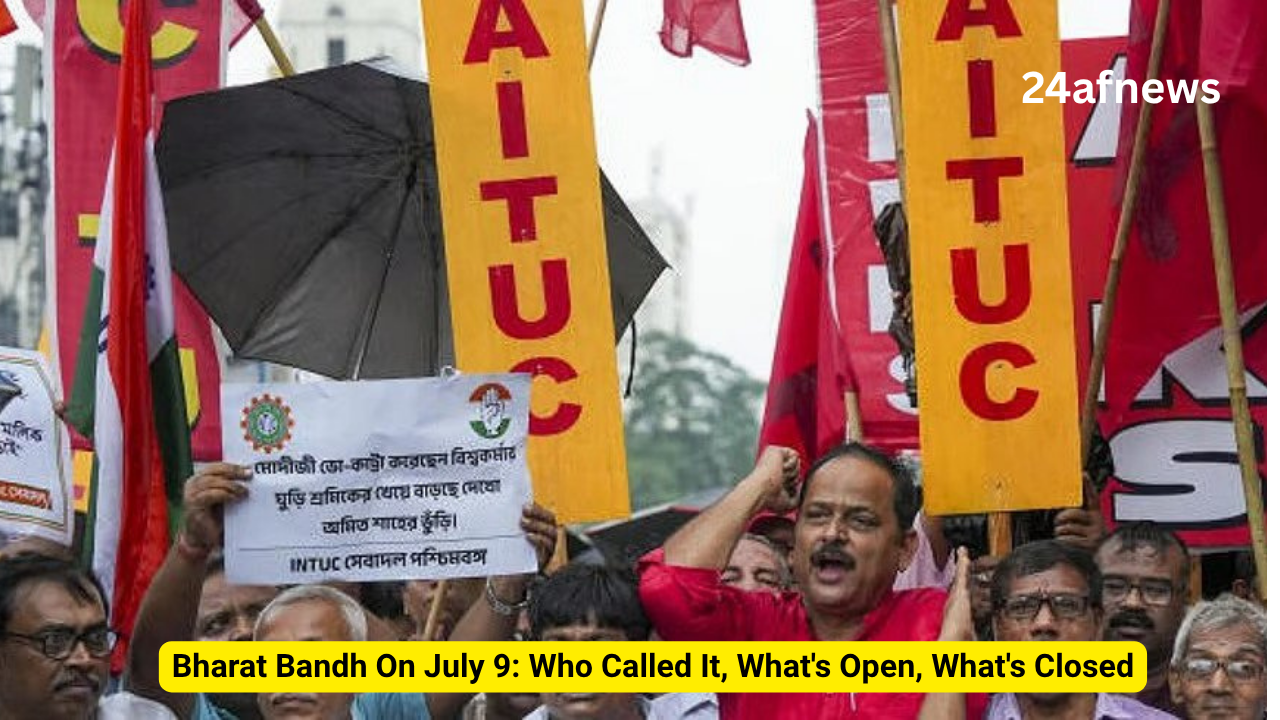
Over 25 crore workers from key government sectors like banking, postal services, mining, construction, and public transport are preparing for a nationwide general strike, popularly known as Bharat Bandh, scheduled for Wednesday, July 9. This massive protest is expected to cause major disruptions across public services, although schools and private businesses are likely to operate as usual.
This Bharat Bandh isn’t just a routine strike—it’s a direct response to long-standing grievances about the government’s labour policies and economic direction. Here’s a deep dive into why it’s happening, who’s involved, and how it will affect your daily life.
Who Has Called the Bharat Bandh on July 9?
The strike has been jointly organized by a coalition of 10 central trade unions, supported by several farmers’ groups and rural worker organizations. Their objective? To express collective dissatisfaction with what they describe as “anti-worker, anti-farmer, and pro-corporate” policies being pushed by the central government.
The leading unions behind this movement include:
-
All India Trade Union Congress (AITUC)
-
Indian National Trade Union Congress (INTUC)
-
Centre of Indian Trade Unions (CITU)
-
Hind Mazdoor Sabha (HMS)
-
Self Employed Women’s Association (SEWA)
-
Labour Progressive Federation (LPF)
-
United Trade Union Congress (UTUC)
Support has also come from Samyukta Kisan Morcha, several rural worker unions, and employees from public sector units like Railways, NMDC Ltd, and steel plants.
According to Amarjeet Kaur of AITUC, “Farmers and rural workers will also join the protest across the country.”
Why Is the Bharat Bandh Happening?
The call for Bharat Bandh stems from a series of socio-economic issues and policy-level grievances. Here’s a breakdown of the major reasons behind this massive protest:
1. Controversial Labour Policies
-
The government’s introduction of four new labour codes is seen as weakening worker protections.
-
These codes allegedly curb workers’ rights to collective bargaining, organizing unions, and going on strike.
2. Rising Unemployment and Inflation
-
With youth unemployment on the rise and inflation affecting household budgets, workers are feeling the pressure more than ever.
3. Cuts in Welfare Services
-
Public funding for essential services like healthcare, education, and urban amenities has reportedly been reduced.
4. Neglect of Worker Representation
-
Not a single national labour conference has been held in the last decade, limiting dialogue between the government and workers.
-
The recruitment of retired officials instead of creating new job opportunities for youth has also fueled discontent.
5. Disenfranchisement and Crackdowns
-
Protesters allege attempts to disenfranchise migrant workers and criminalize peaceful protests using Public Security Bills.
Who Will Be Participating in the Bharat Bandh?
The Bharat Bandh will see participation from workers across both formal and informal sectors, including:
-
Factory workers
-
Bank and insurance employees
-
Postal staff
-
Construction laborers
-
Coal miners
-
Transport sector employees
-
Rural workers and agricultural labourers
With such a large and diverse workforce involved, the strike is expected to be one of the biggest in recent years.
What Are the Key Demands of the Protesters?
The list of demands presented by the protesting unions and workers includes:
-
Immediate withdrawal of the four new labour codes
-
Restoration of full rights to unionise and strike
-
Creation of job opportunities, especially for the youth, who make up over 65% of India’s population
-
Filling of government job vacancies with new recruitments
-
Increase in MGNREGA wages and expansion of the scheme to urban areas
-
Strengthening of public health, education, and civic amenities
From their perspective, these are basic rights that have been ignored or eroded in recent years.
Which Sectors Will Be Affected During the Bharat Bandh?
The following sectors are likely to face major disruptions:
Public Services:
-
Banking and Insurance: Most nationalized and private banks will either close or function at reduced capacity.
-
Postal Services: Expect delays and limited operations.
-
Coal Mining: Mining activities will be halted in many regions.
-
Public Transport: Buses and state transport services in some states may be suspended or delayed.
-
Industrial Production: Factories, especially in the public sector, may be shut for the day.
According to Harbhajan Singh Sidhu of Hind Mazdoor Sabha, “Banking, postal, coal mining, factories, and state transport services will be affected due to the strike.”
What Will Remain Open During Bharat Bandh?
While public sector operations are expected to be hit, many services will continue to function normally. These include:
-
Schools and Colleges: Educational institutions will generally stay open.
-
Private Offices and Businesses: Most private sector companies are expected to operate as usual.
-
Train Services: Although not officially participating in the strike, some train delays may occur due to indirect effects.
How Will This Strike Affect the Common People?
If you depend on public transport or government-run services, the Bharat Bandh could inconvenience you. Banking services may be limited, affecting cash transactions, cheque clearances, and customer support. Similarly, postal deliveries and public transport could be delayed or suspended.
That said, since private offices and schools will be open, daily routines won’t come to a complete halt for many people.
My Opinion: Why Bharat Bandh Matters
As someone observing this closely, I believe this Bharat Bandh highlights a crucial point: there’s a growing disconnect between policy-making and grassroots realities. With over 25 crore workers stepping away from their jobs to voice concerns, it’s a clear signal that inclusive dialogue is overdue.
While not every demand may be feasible immediately, the call for fair labour practices, job creation, and strengthening public services is both valid and necessary for India’s long-term growth.
Ignoring these issues risks widening socio-economic gaps even further.
Final Thoughts
The Bharat Bandh on July 9 is more than just a one-day protest—it’s a reflection of deep-rooted issues in India’s labour ecosystem. From economic grievances to workers’ rights, the issues being raised are urgent and wide-reaching.
If you rely on public sector services, it’s wise to plan your day in advance and expect delays. At the same time, it’s worth taking a moment to understand the motivations behind such a large-scale demonstration. After all, labour rights, job security, and fair economic policies impact us all—directly or indirectly.
Aamir Ahmad Fateh is a seasoned digital marketer and experienced news writer with over 7 years of expertise in covering political affairs, social issues, technology, sports, and Bollywood. He is the founder and chief editor of 24fnews.com, where he is dedicated to delivering accurate, unbiased, and timely news to a wide audience every day. His sharp insights and journalistic integrity make him a trusted voice in the digital news space.



